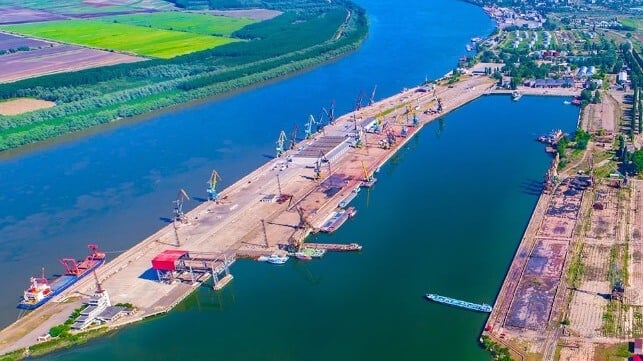Ukraine Plans to Expand Container Shipping Service for Danube Ports

State-owned carrier Ukrainian Danube Shipping Company (UDP) has announced it is planning to launch container shipping on the Middle and Upper Danube River. The company said that the Danube route will offer a new alternative to Ukrainian exporters and carriers, who have had limited options since the beginning of the Russian invasion in 2022. Consultations are ongoing with shippers on the required number of containers needed to form the first caravans.
Currently, UDP offers limited container delivery service to the Danube ports of Bulgaria, Serbia, Hungary, Slovakia, Austria, Germany, and to the Romanian Port of Constanta. However, UDP is implementing an extensive overhaul and repair of its fleet, making available 25 self-propelled vessels and over 200 barges. This capacity is enough to offset reliance on shipment of containers by road. Overland transit trucking has been the primary transport option for Ukrainian containers transshipped through Constanta port.
Container shipping along the Danube route has not been very common, with Ukrainian Danube River Ports of Reni, Izmail and Ust- Dunaisk originally designed for other types of cargo, the biggest volume being agricultural products. But since the onset of Russian invasion, these ports have been adapted by operators to accommodate the rising demand for container shipping.
This saw Maersk last year re-introduce a barge container shipping service from the Port of Constanta to the Port of Reni. The service operates across two routes - via the Constanta/Danube Channel and the Black Sea. The transit time is approximately 1.5 days. Data by Informall BG estimated that Maersk’s barge services on the Danube River could handle a combined capacity of around 3,000 TEUs per month.

that matters most
Get the latest maritime news delivered to your inbox daily.
Meanwhile, the Ukrainian government recently announced that its sea exports returned to pre-war levels in January, thanks to the continued success of its safe shipping corridor along the Black Sea coast.
“More than 660 ships have already passed through the new grain corridor, carrying approximately 20 million tons of cargo to 32 countries around the world. 70 percent of these cargoes contain agricultural products from our agricultural producers,” said Denys Shmyhal, Ukraine’s Prime Minister.
